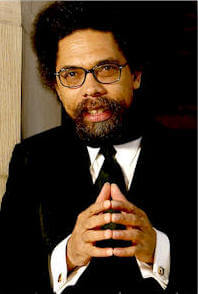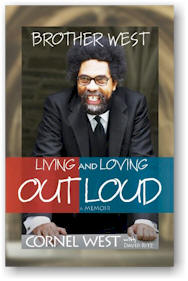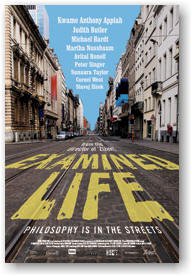The Wild, Wild Dr. West
 One of
One of
Though currently the
Class of 1943 Professor at
Here, he answers questions from readers and talks about the book which explores such themes as Faith, Family, Philosophy, Love and Service.
Cornel West - The ’Brother West’ Interview
Hardcover: 256 pages
New York Times’ best-selling author
Cornel West is one of America’s most provocative and admired
public intellectuals. Whether in the classroom, the streets, the
prisons, or the church, Dr. West’s penetrating brilliance has
been a bright beacon shining through the darkness for decades.
Yet, as he points out in this new memoir, ’I’ve never taken the
time to focus on the inner dynamics of the dark precincts of my
soul.’
with
Kam
Williams

Brother West: Living and Loving
Out Loud, a Memoir
Click to order via
Amazon
Publisher: Smiley Books (October 15, 2009)
Language: English
ISBN-10: 1401921892
ISBN-13: 978-1401921897
Kam Williams: Hi, Dr. West, nice speaking with you again. I loved your autobiography. But do you know how hard it was for me to track you down for another interview?
Cornell West: I appreciate your deep loyalty and commitment.
KW: Why did you decide to write your memoirs?
CW: Tavis Smiley, my dear brother, raised the question of my writing one when the prostate cancer hit 8 years ago. I thought and thought about it and decided maybe I could tell my story to help somebody, so they could see how the power of love and education in my life had transformed me from a gangster with raw rage.
KW: Where did that thug you refer to in the book as ’Little Ronnie’ come from, and how did you get past that phase?
CW: I was just mad, a born rebel. I had loving parents, a loving church and loving friends, yet I was mad, and I needed constructive venues to express that rage. I was able to find them owing to the power of love and education. So, it became a righteous indignation against injustice. It became a holy anger against unfairness. And I’ve had it ever since.
KW: Reverend Florine Thompson asks, where should we look to
reclaim the prophetic voice regarding the war in
CW: No, no! Obama can’t get the Nobel Peace Prize and be a war President. He’s got to be able to promote peace in an international, multilateral way. We don’t need an American occupation; we don’t need more American troops there. If he does send more, then we’ve got to take to the streets.
KW: Reverend Thompson also asks, with the rise in black-on-black teen crime, what should the religious community be doing differently to address this issue? Is "The Church" merely irrelevant in the lives of our youth? Many have said that our youth have little or no regard for God, church or religion since prayer was taken out of public schools.
CW: No, I don’t think taking prayer out of schools was the cause of young people being suspicious of religion. That goes back a long way. It has more to do with the fact that older folk did not exemplify the kind of love and justice that the young people would like to see. Therefore, they saw old people as hypocrites more tied to Church-ianity than Christianity. So, a lot of it has to do with the failings of the older generation which led to the younger generation’s going off to look for alternatives. Unfortunately, a lot of times they turned to ugly things like guns and drugs, given the easy access to guns because of lax gun control laws, and to drugs because the government can’t keep them out of the country. In addition, the youth don’t have too many alternatives to the decrepit housing and disgraceful school systems which provide very little opportunities for those in the urban ’hoods. So, I think the whole issue of young people and churches has much more to do with social forces than it does with just not having prayer in schools.
KW: How do we save our young men, then? Where are the black male role models?
CW: There’s only one way to save young black people, and that’s to love ’em, love ’em, love ’em, care for ’em, attend to them, embrace them, target them, concentrate on them, and make them feel as if they’re somebody, because that’s the only way they get self-respect and self-confidence, which are the two prerequisites for flowering and flourishing in life.
KW: The good Reverend has a question about healthcare: What should the church be doing to foster healthcare reform?
CW: Hmm’ A lot of churches need to bear witness for the least of our brethren’ for the weak, for the poor, for the orphaned, for the widowed, for the children. And the only way you get set on fire is you gotta be Born Again. You have to undergo fundamental awakening and conversion and metamorphosis.
KW: Reverend Thompson asks about the outcry of "You lie!" to President Obama by a Republican Congressman Joe Wilson. Was it a slip of the lip or confirmation that race matters?
CW:
Well, it certainly was an act of disrespect. The very act of
disrespecting the President of the
KW: How would you say President Obama is doing on a scale of 1 to 10?
CW: It depends on which issue you’re talking about. On ecology and the environment, I would give him a 7. On war, I’d give him a 3. On the economy, a 2. In terms of his trying to sustain a new atmosphere and new ethos in the country and around the world, I’d give him an 8. So, it goes up and down, relative to each issue.
KW: Children’s book author Irene Smalls says, you recently launched a spoken word or rap career. How does that jibe with your academic pursuits?
CW: Oh, it’s quite consistent, because I’m an educator. When I write books, that’s textual education. When I do spoken word, that’s singing education. When I dance, it’s dancing education. All of it has to do with trying to awaken people to become more courageous to bear witness to love and justice in the world.
KW: Our mutual friend, Ila Forster, who was at
CW: This is the first that I’m hearing about it. Tell Sister Ila thanks so much for letting me know about it.
KW: Although Ila didn’t make it back to campus, she says she
heard that your speech at the recent black alumni reunion
conference at
CW: Oh, we had a wonderful time.
KW: Jimmy Bajan says he agrees with you that we haven’t turned a
corner just because we have a black president. He asks, what
will it take to see a level playing field? With so many blacks
and whites still living in poverty in this country and so many
children without healthcare, how far are we from seeing an
equitable society realized where there’s coverage for everyone
comparable to
CW: I agree with Brother Jimmy. We certainly haven’t turned a corner. Not at all. And we’re a long way from there being a level playing field, just like we’re a long way from poor people enjoying the same opportunities as the well-to-do. It depends on the quality of our struggle, the quality of our commitment and the quality of our conviction.
KW: Lester Chisholm asks, what can people do to avoid spiritual, emotional, mental, and physical compliancy?
CW: They’ve got to hang around folks who are on fire with a love for justice.
KW: Lester also asks, what movie do you recommend for people to begin empower themselves?
CW: Tell him to watch The Matrix.
|
Unrated Read and AALBC.com Film Review Offering privileged moments with great thinkers from fields ranging from ethics to cultural theory, Examined Life reveals philosophy’s power to transform the way we see the world around us and imagine our place in it. |
KW: How about that film you appeared in this year called Examined Life? That was a very powerful documentary.
CW: I appreciate that. I had a great time working with Astra Taylor on that. She’s a wonderful sister.
KW: Why do you refer to everyone by either brother or sister, even if they’re not black?
CW: All human beings are vanishing creatures and disappearing organisms trying to find a little meaning and love before they die. In that sense, we’re all trying to work it out. And when I say ’brother’ or ’sister’ to every person without regard to color, or culture or civilization, I’m just paying tribute to their struggling.
KW: well, Sister Laz Lyles says, I just want to know how he keeps his afro so tight.
CW: [LOL] well, I haven’t had a haircut since 1984. So, it tends to just fall in place every morning. I don’t know how long it’ll last. I might be baldheaded in a coupe of years if the crisis hits me. You never know.
KW: On a more serious note, Laz wants to know if you consider W.E.B. Du Bois’s idea of double consciousness still relevant with the Obama presidency.
CW: Oh, absolutely. It’s deeply relevant, because there’s still a veil between the black and white world when it comes to cultural, religious and other divides.
KW: Laz’s also asks, after healthcare, what is the next area of major reform you’d like to see Obama address?
CW: We need reform in the military, both in terms of military policy, and in terms of its internal dynamics.
KW: Tale grad Tommy Russell asks, do you think Barack Obama is being treated less fairly or with less dignity than previous presidents?
CW: Yes, by Brother Rush [Limbaugh], Brother Sean [Hannity] and Brother Bill O’Reilly. I think they hardly respect him at all. In fact, I think they are very demeaning and disrespectful. On the other hand, the liberal press has been so deferential, that they haven’t engaged in the criticisms that they should. So, it cuts both ways. Barack Obama needs to be protected, and he needs to be respected, but he also needs to be corrected. Criticisms are important when they’re based on principle, man, because in the end, it’s not about Obama, it’s about poor people and working people.
KW: Do you think inheriting the nation in the state it was left behind by Bush is dragging on Obama’s efficiency?
CW:
Absolutely! He came in under catastrophic conditions. George
Bush had handed him a multi-layered mess. He’s been trying to
get out from under that mess. However, the War in
KW: Sue Doran asks, if you’ve read anything by Chris Hedges?
CW: Yes, the author of American Fascism. He’s a very important, prophetic voice in the culture.
KW: Postal clerk Ron Clark says, you’re one of his regular customers at the Princeton Post Office, and that you always take one of the Tootsie Pops he gives out.
CW: Brother Ron! He has such a wonderful spirit about him. Just to see him uplifts you, and helps make your day a better day.
KW: Ron asks, where did you develop your oratory skills?
CW: Probably in the church and on the block.
KW: Ron follows up with, have you had any interaction with Angela Davis?
CW:
Oh Lord, yes! I was just with Angela not long ago. She
introduced me at a lecture at the
KW: Tony Noel, a Muslim brother, says that he and you share a common challenge in life besides being of African descent. ’We are both survivors of prostate cancer.’ He asks, how do you feel that we can best spread the word to our brothers in the human race about this disease?
CW: Well, first let me say a prayer for my dear brother’ Secondly, we need to lift our voices. That’s why when I travel to conferences I encourage black brothers to get a PSA exam to catch it early, so they can live longer.
KW: The music maven Heather Covington question: What music are you listening to nowadays?
CW: I start off in the morning with gospel, with James Cleveland, and often end with George Clinton’s ’One Nation under a Groove.’
KW: Thanks again, Dr. West, and best of luck with the book and all your endeavors.
CW: I appreciate you’re taking this time, and I deeply apologize about how hard it was for you to find me, but I’ve been on the run lately. You just stay strong, my brother.
KW: No problem, Brother West.
Related Links
Cornel West: The
Hope on a Tightrope Interview
https://aalbc.com/reviews/cornel_west.htm
AALBC.com Author
Profile for Cornel West
https://aalbc.com/authors/cornel.htm
Cornel West & Company Weigh-In on the
State of American Culture in the DVD Examined Life
https://aalbc.com/reviews/examined_life.htm


